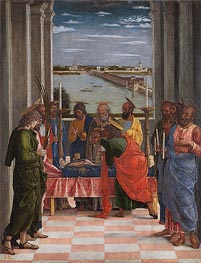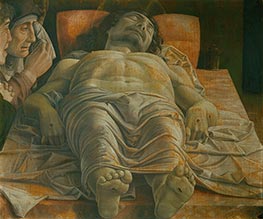Andrea Mantegna Painting Reproductions 1 of 1
c.1431-1506
Italian Early Renaissance Painter
Andrea Mantegna (1431-1506) was an Italian Renaissance painter and engraver, born in Isola di Carturo, near Padua. He was one of the most important painters of his time and is known for his innovations in perspective and his use of foreshortening in his works. Mantegna was a court painter for the Gonzaga family in Mantua and painted many altarpieces and frescoes for churches and palaces. Some of his most famous works include "The Triumphs of Caesar," "The Madonna della Vittoria," and "The Dead Christ." Mantegna's style had a lasting impact on Renaissance art and his innovations in perspective and use of light and shadow greatly influenced later generations of artists.
Mantegna was trained in the workshop of Francesco Squarcione, a Paduan master of antique and medieval art. There he learned the principles of classical art and developed a deep appreciation for ancient Roman art and architecture.
Mantegna's style was characterized by his interest in classical themes, his use of perspective, and his attention to detail. He often incorporated classical motifs, such as columns and arches, into his paintings, and his use of foreshortening helped to create a sense of depth in his compositions.
Mantegna became a court painter for the Gonzaga family in Mantua in 1460 and remained in their service for the rest of his life. He painted many altarpieces, frescoes, and portraits for the Gonzaga family and produced some of his most important works during this time.
Mantegna was also an accomplished printmaker and is considered one of the pioneers of the medium. He created several series of prints, including the "Triumphs of Caesar," which depicted scenes from ancient Roman history. These prints had a major impact on the development of printmaking as an art form and are considered some of the finest examples of Renaissance engraving.
Overall, Andrea Mantegna was a highly influential Renaissance artist whose innovations in painting and printmaking had a lasting impact on the development of Western art.
Mantegna was trained in the workshop of Francesco Squarcione, a Paduan master of antique and medieval art. There he learned the principles of classical art and developed a deep appreciation for ancient Roman art and architecture.
Mantegna's style was characterized by his interest in classical themes, his use of perspective, and his attention to detail. He often incorporated classical motifs, such as columns and arches, into his paintings, and his use of foreshortening helped to create a sense of depth in his compositions.
Mantegna became a court painter for the Gonzaga family in Mantua in 1460 and remained in their service for the rest of his life. He painted many altarpieces, frescoes, and portraits for the Gonzaga family and produced some of his most important works during this time.
Mantegna was also an accomplished printmaker and is considered one of the pioneers of the medium. He created several series of prints, including the "Triumphs of Caesar," which depicted scenes from ancient Roman history. These prints had a major impact on the development of printmaking as an art form and are considered some of the finest examples of Renaissance engraving.
Overall, Andrea Mantegna was a highly influential Renaissance artist whose innovations in painting and printmaking had a lasting impact on the development of Western art.
2 Mantegna Paintings

Death of the Virgin c.1462
Oil Painting
$2560
$2560
Canvas Print
$57.87
$57.87
SKU: MAA-16459
Andrea Mantegna
Original Size: 54.5 x 42 cm
Prado Museum, Madrid, Spain
Andrea Mantegna
Original Size: 54.5 x 42 cm
Prado Museum, Madrid, Spain

Lamentation of Christ c.1470/1474
Oil Painting
$2141
$2141
Canvas Print
$63.55
$63.55
SKU: MAA-17707
Andrea Mantegna
Original Size: 68 x 81 cm
Pinacoteca di Brera, Milan, Italy
Andrea Mantegna
Original Size: 68 x 81 cm
Pinacoteca di Brera, Milan, Italy